Implementing Business Continuity: A Step-by-Step Guide for Classic Fine Foods Malaysia
Chapter 1
BCM Planning Methodology for Classic Fine Foods Malaysia
Introduction
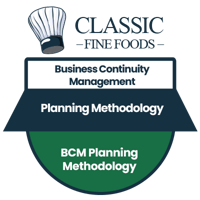
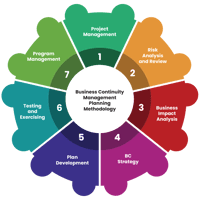 In today’s dynamic business environment, disruptions can sometimes threaten the continuity of operations and the ability to deliver customer products and services.
In today’s dynamic business environment, disruptions can sometimes threaten the continuity of operations and the ability to deliver customer products and services.
For Classic Fine Foods (CFF) Malaysia, a robust Business Continuity Management (BCM) Planning Methodology is essential to ensure resilience and the ability to recover swiftly from disruptions.
 This chapter outlines a comprehensive seven-phase methodology tailored to CFF Malaysia's unique needs.
This chapter outlines a comprehensive seven-phase methodology tailored to CFF Malaysia's unique needs.
It ensures that the organisation is prepared to face challenges and maintain operational excellence.
1. Project Management
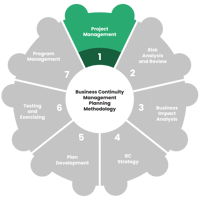 Effective project management is the foundation of any successful BCM initiative.
Effective project management is the foundation of any successful BCM initiative.
This phase involves establishing the framework, objectives, and governance structure for the BCM program.
-
Key Activities:
-
Define the scope, objectives, and deliverables of the BCM program.
-
Assign roles and responsibilities, including appointing an Organisation BCM Coordinator or Team.
-
Develop a project plan with timelines, milestones, and resource allocation.
-
Secure executive sponsorship and stakeholder buy-in.
-
Establish communication channels to keep all stakeholders informed.
-
-
Outcome: A well-defined project plan ensures the BCM initiative is aligned with CFF Malaysia’s strategic goals and operational priorities.
2. Risk Analysis and Review (RAR)
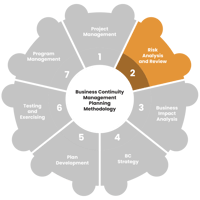 Understanding potential risks is critical to developing an effective BCM plan.
Understanding potential risks is critical to developing an effective BCM plan.
This phase involves identifying, assessing, and prioritising risks that could disrupt business operations.
-
Key Activities:
-
Conduct a thorough risk assessment to identify internal and external threats (e.g., supply chain disruptions, natural disasters, cyberattacks).
-
Evaluate the likelihood and impact of each risk.
-
Prioritize risks based on their potential impact on operations and reputation.
-
Document findings and update the risk register regularly.
-
-
Outcome: A clear understanding of CFF Malaysia's risks enables the organisation to focus on mitigating high-priority threats.
3. Business Impact Analysis (BIA)
The Business Impact Analysis phase focuses on identifying critical business functions and processes and the potential consequences of disruptions.
-
Key Activities:
-
Identify key business functions and processes essential to Classic Fine Foods Malaysia’s operations.
-
Determine the maximum acceptable outage time (MAOT) for each function.
-
Assess the financial, operational, and reputational impacts of disruptions.
-
Identify dependencies, including suppliers, technology, and personnel.
-
-
Outcome: A prioritised list of critical functions and processes, recovery time objectives (RTOs) and recovery point objectives (RPOs).
4. Business Continuity Strategy (BCS)
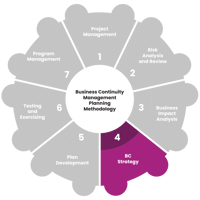 Based on the Risk Analysis and BIA findings, this phase involves developing strategies to ensure the continuity of critical operations.
Based on the Risk Analysis and BIA findings, this phase involves developing strategies to ensure the continuity of critical operations.
-
Key Activities:
-
Develop strategies to mitigate identified risks (e.g., diversifying suppliers and implementing backup systems).
-
Establish recovery strategies for critical business functions, including alternate work locations and IT disaster recovery plans.
-
Define resource requirements, including personnel, equipment, and technology.
-
Align strategies with the organisation’s risk appetite and budget.
-
-
Outcome: A comprehensive set of strategies to ensure the continuity of CFF Malaysia’s critical operations during disruptions.
5. Plan Development (PD)
 In this phase, the strategies developed are formalised into actionable BCM Plans.
In this phase, the strategies developed are formalised into actionable BCM Plans.
-
Key Activities:
-
Document detailed response and recovery procedures for each critical business function.
-
Develop incident management plans, including roles and responsibilities during a disruption.
-
Create communication plans to ensure timely and accurate information sharing with stakeholders.
-
Integrate BCM Plans with other organisational plans, such as crisis management and IT disaster recovery plans.
-
-
Outcome: A set of well-documented and actionable BCM Plans tailored to CFF Malaysia’s needs.
6. Testing and Exercising
 Regular testing and exercise are essential to ensuring the effectiveness of the BCM Plans.
Regular testing and exercise are essential to ensuring the effectiveness of the BCM Plans.
This phase validates the plans and identifies areas for improvement.
-
Key Activities:
-
Conduct tabletop exercises to simulate disruptions and test response procedures.
-
Perform functional drills to evaluate the readiness of personnel and systems.
-
Review and update plans based on lessons learned from exercises.
-
Train employees on their roles and responsibilities during a disruption.
-
-
Outcome: Validated and improved BCM Plans and a more prepared and confident workforce.
7. Program Management
 Business Continuity Management is an ongoing process that requires continuous monitoring, review, and improvement.
Business Continuity Management is an ongoing process that requires continuous monitoring, review, and improvement.
This phase ensures the BCM program remains effective and aligned with organisational goals.
-
Key Activities:
-
Establish a governance structure to oversee the BCM program.
-
Conduct regular audits and reviews to assess the program’s effectiveness.
-
Update plans to reflect changes in the business environment, such as new risks or operational changes.
-
Promote a culture of resilience by engaging employees and stakeholders in BCM activities.
-
-
Outcome: A sustainable and adaptive BCM program that ensures CFF Malaysia remains resilient despite disruptions.
Summing Up ...
The seven-phase BCM Planning Methodology provides a structured and comprehensive approach to ensuring CFF Malaysia's resilience.
By following this methodology, the organisation can effectively identify risks, protect critical operations, and recover swiftly from disruptions, safeguarding its reputation and ability to serve customers.
This proactive approach enhances operational resilience and strengthens stakeholder confidence in CFF Malaysia’s commitment to business continuity.
This chapter is the second part of the eBook "Driving Business Continuity: Implementing BCM for Classic Fine Foods Malaysia." eBook two is titled "Implementing Business Continuity: A Step-by-Step Guide for Classic Fine Foods Malaysia", which provides a comprehensive guide to implementing a BCM system in alignment with ISO 22301
| Driving Business Continuity: Implementing BCM for Classic Fine Foods Malaysia | |||||
| Implementing Business Continuity: A Step-by-Step Guide for Classic Fine Foods Malaysia | |||||
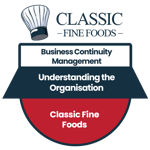 |
 |
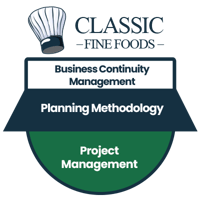 |
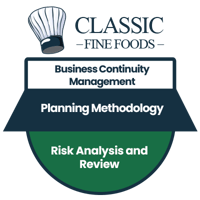 |
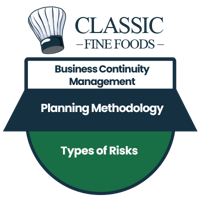 |
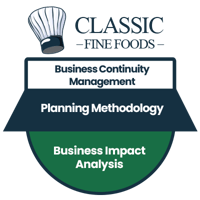 |
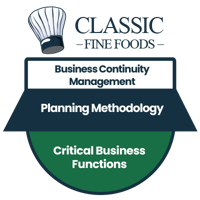 |
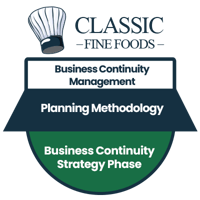 |
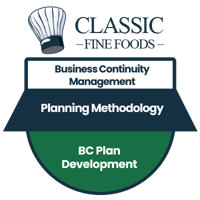 |
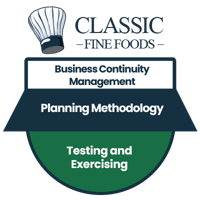 |
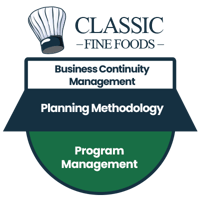 |
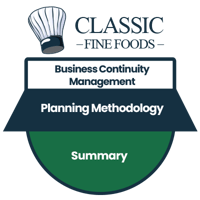 |





![Register [BL-B-3]*](https://blog.bcm-institute.org/hs-fs/hubfs/hub_generated/resized/19a8306f-6b76-45ff-8585-95111f393aeb.png?width=200&height=56&name=19a8306f-6b76-45ff-8585-95111f393aeb.png)



![FAQ [BL-B-3]](https://blog.bcm-institute.org/hs-fs/hubfs/hub_generated/resized/9b7f5669-8ad6-450b-a98f-5f5d49ebfc8e.png?width=150&height=150&name=9b7f5669-8ad6-450b-a98f-5f5d49ebfc8e.png)
![Email to Sales Team [BCM Institute]](https://blog.bcm-institute.org/hs-fs/hubfs/hub_generated/resized/83ae9ad3-affc-416e-8f51-64218d6d98f2.png?width=100&height=100&name=83ae9ad3-affc-416e-8f51-64218d6d98f2.png)





